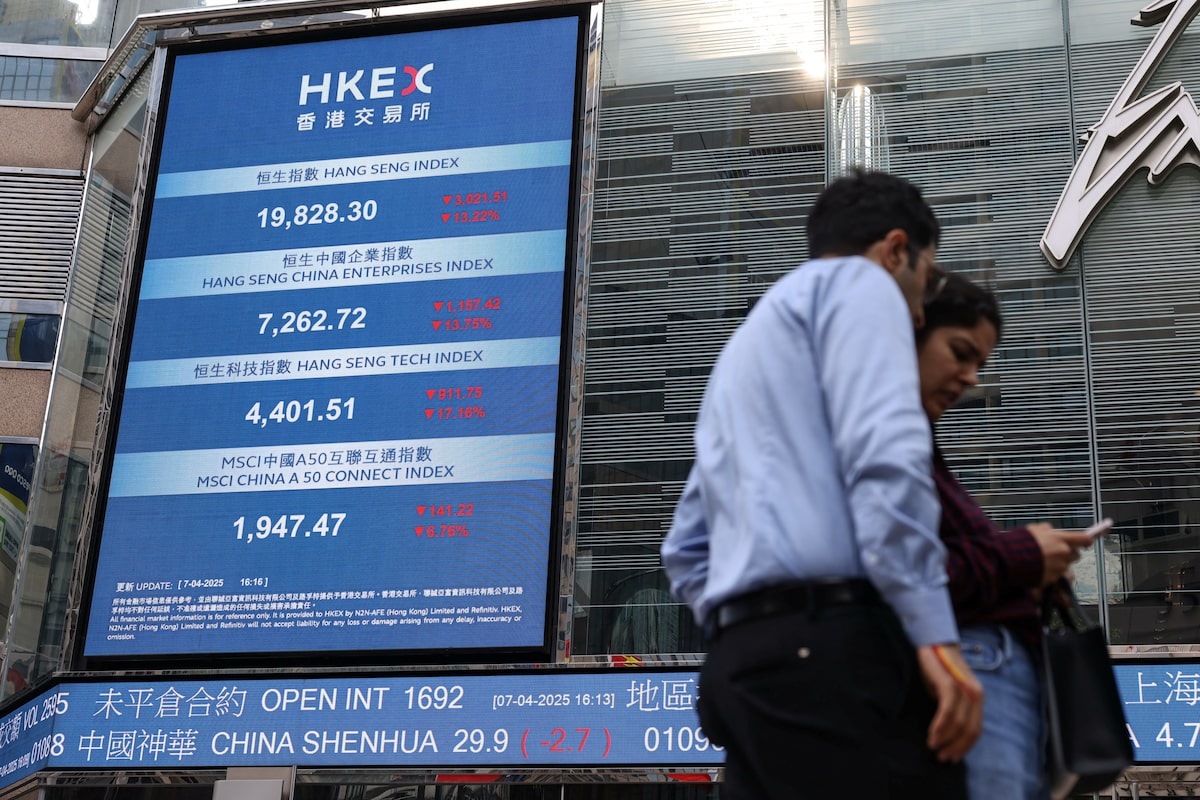Asian markets tumble on Trump trade war panic, as China plays down economic risk

A screen displays the closing Hang Seng Index in Hong Kong on April 7.Tyrone Siu/Reuters
Stock markets across Asia plunged Monday, joining a global rout sparked by U.S. President Donald Trump’s sweeping tariff hikes last week.
Circuit breakers were triggered in several markets around the region as traders rushed to sell off shares, with banks among the worst hit stocks. Taiwan’s stock market, which had been closed last Thursday and Friday for a holiday, saw its biggest one-day percentage fall on record, at almost 10 per cent, and markets in China and Hong Kong also saw major drops, after initially defying pessimism around Mr. Trump’s growing trade war.
On Friday, Beijing responded in kind to new U.S. tariffs of 34 per cent, calling Mr. Trump’s measures – which raised the effective levy on many Chinese goods to a cumulative 50 or 60 per cent – a “unilateral bullying practice” out of step with global norms.
In a front-page editorial Monday, the People’s Daily – official mouthpiece of the Chinese Communist Party – said the new levies “will severely restrict bilateral trade and inevitably cause short-term negative effects on our exports, increasing economic downward pressure,” but noted “the sky won’t fall.”
“Our exports to the U.S. as a percentage of total exports have decreased from 19.2 per cent in 2018 to 14.7 per cent in 2024, meaning reduced U.S. exports won’t cause a devastating impact on our overall economy,” the paper said, whereas “many U.S. products have high dependency on China.”
The editorial said China had a “strong capacity to withstand the pressure,” with “plenty of countermeasures at hand.” It added that unlike many other countries, reeling from the shock of Mr. Trump’s aggressive measures, “after eight years of trade war with the U.S., we’ve built up a wealth of experience in this struggle.”
A glimpse of that potential response was offered Monday, as China’s sovereign wealth fund intervened to prop up the capital market.
Speaking to U.S. business leaders at a roundtable over the weekend, China’s vice minister for commerce Ling Ji urged them to “speak out” against Mr. Trump’s measures.
“The root of the tariff problem lies in the U.S.,” Mr. Li said, according to state media. “We hope that American companies will trace the source, clarify the cause and effect and speak out rationally.”
Hong Kong-based commentator Wang Xiangwei noted Beijing may “view Trump’s extreme measures as an opportunity.”
“Although the tariffs deliver a short-term blow to China’s economy, these measures could serve as a catalyst for China to increase domestic stimulus and take decisive steps to forge closer trade and economic ties with its major trading partners who were also affected by the higher U.S. tariffs,” he wrote in a Monday newsletter.
So far, Beijing is the only major Asian economy to retaliate against the U.S., as other governments in the region desperately seek talks with the White House on tariff relief.
Over the weekend, Vietnam, one of the worst hit countries, said it was willing to drop its own tariffs on U.S. imports to zero as part of negotiations to delay or remove the new 46-per-cent levies on Vietnamese goods. Hanoi also held talks Sunday with Malaysia, which is attempting to co-ordinate a regional response, according to Prime Minister Anwar Ibrahim.
“Malaysia, as ASEAN chair, will lead efforts to present a united regional front, maintain open and resilient supply chains, and ensure ASEAN’s collective voice is heard clearly and firmly on the international stage,” Mr. Anwar said on social media.
In Japan, where stocks fell sharply Monday, Prime Minister Shigeru Ishiba said he was also hoping to negotiate relief from new 24-per-cent tariffs, which he described as “extremely disappointing and regrettable,” according to Japanese media.
Tony Sycamore, a market analyst at IG Australia, said in a note Monday that over 50 countries were reportedly seeking to negotiate tariff relief with the U.S., but noted that even if Mr. Trump is amenable to such talks, “there is a risk that the relief doesn’t arrive quickly enough,” damaging growth and sending “the global economy into recession.”
With files from Reuters
